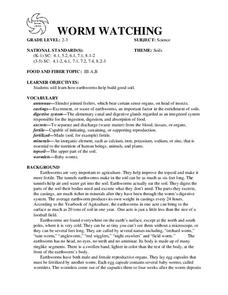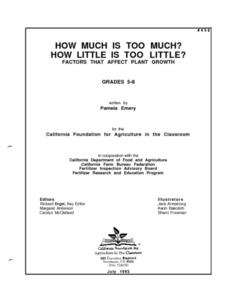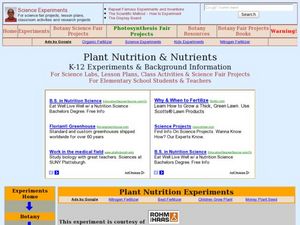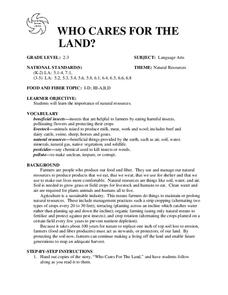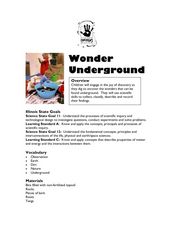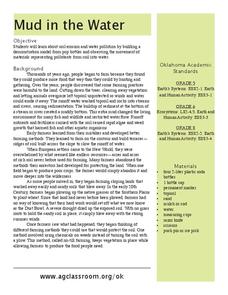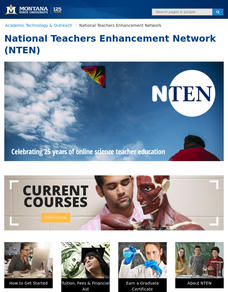Curated OER
Factors Affecting Plant Growth
High schoolers determine the physical and chemical factors that affect plant growth. For this biology lesson, students explain the role of hormones in plants. They investigate how competition with other plants affect their growth.
Curated OER
WORM WATCHING
Students investigate how earthworms help build good soil. They examine the worms carefully to find the ringlike segments and swollen band at the front of the earthworm's body. Students take turns dampening the soil every day and adding...
Curated OER
How Much Is Too Much? How Little Is Too Little?
Learners perform a series of experiments which show that plants require nutrients in certain quantities. They also cooperatively read materials on the nutrient requirements of plants, fertilizers, composting, and soil management, and...
Curated OER
Plant Nutrition and Nutrients
Learners observe seeds growth and examine the different parts of the seedling. In this biology lesson, students compare the growth of seeds planted in soil and in hydroponics. They record their observations in their science journal and...
Curated OER
WHO CARES FOR THE LAND?
Students explore the importance of natural resources. They are given copies of the story, "Who Cares For The Land," and students follow
along as the teacher reads it. Students identify the key points in the story. (Soil, water and air...
Curated OER
Making a Mini Worm Habitat
Third graders create an earthworm habitat. In this worms lesson, 3rd graders construct a KWL chart about earthworms and research their habitat. Students create a mini habitat for their earthworms by using gravel, sand, cloth, and soil.
Curated OER
Making a Mini Worm Habitat
Students explore the process of converting organic waste into usable fertilizer. They observe how living and nonliving things interact with one another by making a mini-worm habitat.
Curated OER
Wonder Underground
Young scholars classify and record objects they find "underground." For this observation lesson, students dig into bins filled with soil and encounter various objects such as bark, twigs, etc. Young scholars classify their findings.
Curated OER
An Underground River
Seventh graders describe how water flows through the ground, what an aquifer is and what soil properties are used to predict groundwater flow. They consider the affects of pollution on groundwater supplies and write a letter drawing...
Curated OER
Nature's Recycling Program
Students identify what materials make up compost. In this science of recycling lesson, students explain the benefits of composting determine how compost is a good plant fertilizer.
Nuffield Foundation
Observing Earthworm Locomotion
One acre of land can contain more than a million earthworms. Scholars collect earthworms to observe their movements. Once placed on paper, the sound of movement often fascinates pupils. When placed on glass, the earthworm is unable to...
Curated OER
What's Organic?
Learners define and discuss terms organic and synthetic, read article pertaining to organic agricultural practices in Oklahoma, complete worksheet, grow plants using both commercial and organic fertilizer, compare growth rates, and chart...
Curated OER
Erosion
Fifth graders study what erosion is, what causes it, and ways to slow its progress. They complete an experiment that depicts soil moving down a slope as water is poured on it to show how moving water erodes land. Next, they observe...
Curated OER
Erosion
Young scholars discover the meaning of the word erosion and discuss effects of rocks and sticks upon the soil. They then work in small groups to construct a model of erosion to make observations and then write them in their science...
Curated OER
An Investigation into Effects of Rhizobium Soil Bacteria on Nitrogen Availability
Students identify the control and the variables in the experiment. They describe the growth of plants with and without nitrogen fixing bacteria, then name the bacterium responsible for making nitrogen available to the plant.
Curated OER
Ag in My Community; Agriculture
Students build knowledge about agriculture as it relates to their communities' commodities. For this agriculture lesson, students brainstorm about conditions in their community with regards to growing different types...
Curated OER
Squanto's Science Lesson
Students explore Squanto's contribution to the settlers. They plant seeds and follow instructions for water and fertilization. Students keep a record of the growth of the seeds. They write a paragraph that tells what they learned from...
Alabama Learning Exchange
Where is the Dirt? A Lesson in Hydroponics
Young scholars use the Internet to research hydroponic gardening which is the growing of plants without soil. They participate in an experiment where a hydroponic garden is contructed in the classroom for observaion. They recorde...
Curated OER
Composting
Young scholars discover the concept of decomposition. They examine how it makes the soil more fertile and how it helps plants. They put a compost bin in their backyard and record their observations.
Curated OER
Mud in the Water
Sixth graders investigate erosion. In this erosion lesson, 6th graders explore how farming changes the environment. Students construct an erosion model and research ways to protect the soil from excess mud generated by farming.
Curated OER
Root, Root, Root for the Nutrients
Students observe the growth of a seed, predict what will happen when seeds are planted without soil, and conduct an experiment using a hydroponics system.
Curated OER
Demonstrating Erosion in Action
Students easure and record volume of water, then measure and record mass of soil. They explain the effects of the following in controlling erosion: Contouring, cover crop, strip cropping, reforestation, inter-seeding.
Curated OER
Recycling by Composting
Pupils examine the idea of recycling by composting. Using the internet, they research the benefits of composting to the environment. In groups, they collect numbers on how much food and yard waste is produced in their community. They...
Curated OER
Cotton Seed Planting
Students using scientific inquiry will observe and record in daily journals their findings on cotton seeds. They measure, graph, and then communicate their discoveries about plants to each other.

